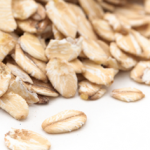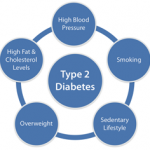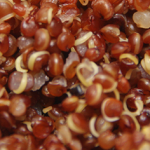Red Peppers
Regulating Glucose
Regulation of glucose is highly important for sufferers of diabetes. While many food sources regulate glucose through the use of nutrients that cause the specific source of nutrition to process slowly within the digestive system, red peppers use capsaicin to influence to rate of metabolism for all carbohydrates. Carbohydrates are broken down into natural glucose at a rate which lessens their rate of absorption into the bloodstream, causing blood glucose levels to raise slowly with lower chances of spiking.
Weight Loss
The way in which capsaicin affects metabolism can also have implications for weight loss. Capsaicin helps to fight inflammation. The same chemical compounds in the body that are linked to pain and disease are suspected to have links to obesity as well. These compounds affect nerves which are equipped with what are known as TRPV1 receptors. When activated, these receptors release chemicals that are known to influence blood sugar spikes as well as obesity. Capsaicin helps to weaken these receptors, thereby also weakening their effects on the body.
Regulating Insulin and Insulin Resistance
The same receptors that affect blood sugar and obesity are also responsible for insulin resistance. By weakening the receptors, the body’s susceptibility to insulin’s effects is greatly increased. In the same way that high consumption of spicy foods can numb the taste buds for a short time, capsaicin numbs harmful nerve endings inside the body. Not only this, but capsaicin can aid in the production of adiponectin, which has also been known to have several health benefits. Adiponectin yields some of the same results as capsaicin. It can lower blood sugar, raise the effectiveness of insulin, promote weight loss, and have a generally positive impact on the body’s metabolic rates.Usage
Since red peppers are fairly spicy, they are not a food which is likely to be implemented into most diets on a particularly large scale. Red peppers come in many forms, and are most often used as a spice on other dishes. One can increase their intake of capsaicin through the use of chili powder, cayenne, red pepper flakes, or even small amounts of whole red chili peppers.
The studies conducted on the positive effects of red peppers used fairly light amounts. No more than three tablespoons was consumed within a single day by any test subject. This was all it took to yield positive results. Both blood glucose and insulin levels were stabilized, neither too high nor too low.
Cautions
It is important when working with red peppers to not let any of it get into the eyes. Overconsumption can also lead to mild illness as well as disturbances of the gastrointestinal system. In incredibly high quantities, there have been rare cases of cardiac arrest. Nonetheless, in more mild quantities, red peppers are a great source of capsaicin and all of the health benefits that come with it.

























